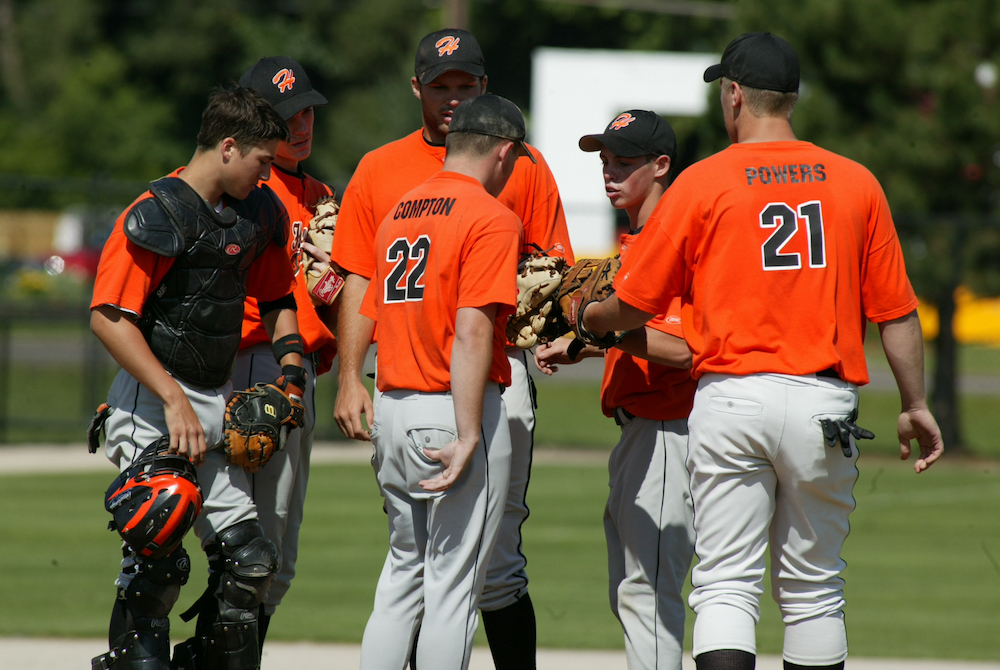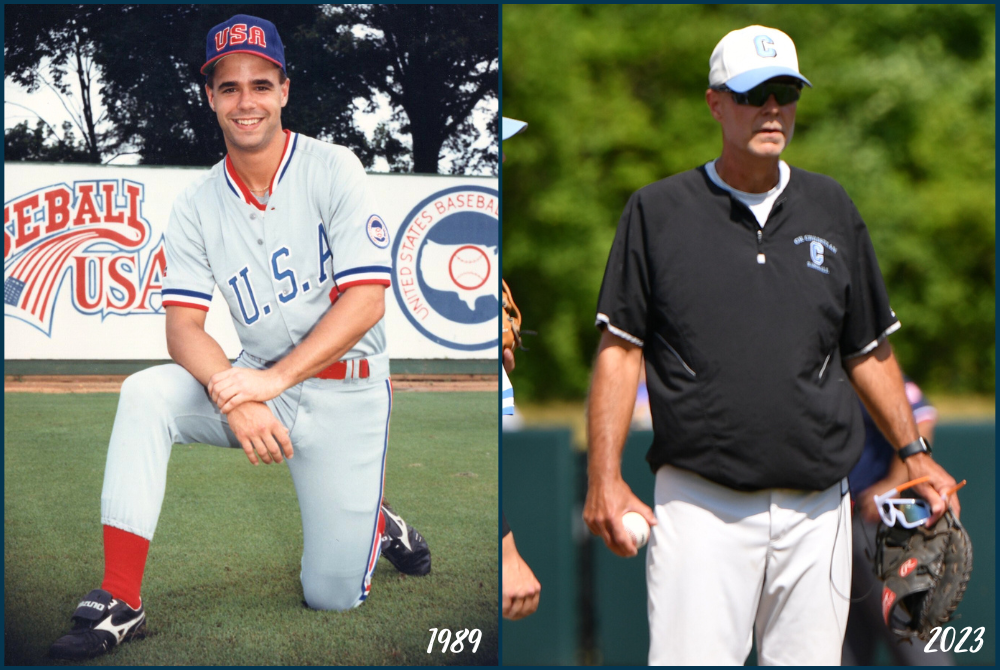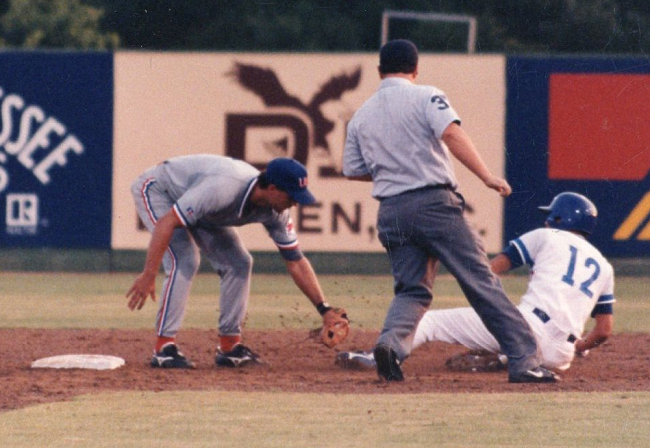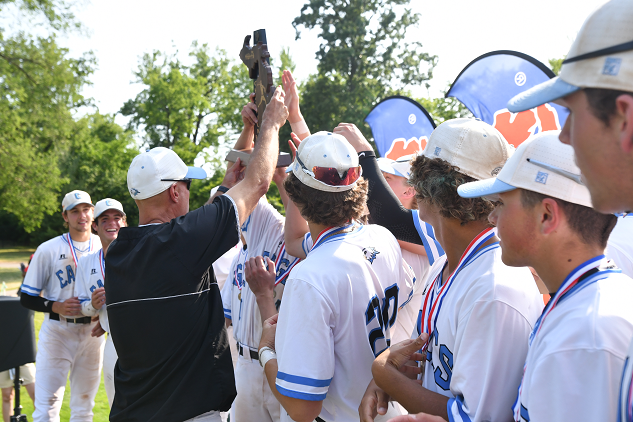
St. Mary's Record Run Recalls Homer's 'Small-Town Baseball Odyssey'
By
Geoff Kimmerly
MHSAA.com senior editor
April 21, 2023
As Orchard Lake St. Mary’s celebrated setting the MHSAA record for longest baseball winning streak at 77 and counting over the weekend – and with a national record certainly within reach this season – we can recall just two decades ago when Homer’s similar streak and the two seasons of buzz it stirred was on the verge of its start.
Homer, representing a community of about 1,700 residents, finished 38-0 on the way to winning the Division 3 championship in 2004, and then returned to win its first 37 games of 2005 before falling to Saginaw Nouvel 7-6 in that season’s Division 3 Final at Battle Creek’s C.O. Brown Stadium.
Along the way over those two seasons, the Trojans smashed the previous MHSAA baseball consecutive wins record of 56, and went on to set a national record of 75 straight wins that stood until 2011, when it was surpassed by both Martensdale St. Mary’s of Iowa and Portsmouth, N.H. The latter has topped the national list since 2012 after extending its winning streak into 2012 to the current record of 89 games.
Battle Creek Enquirer reporter Jeff Karzen followed Homer’s record run through many of its most notable moments, and that coverage and the relationships built during that time – and as the Trojans came back to win the Division 4 title in 2006 – led to his first book “Homer: The Small-Town Baseball Odyssey” published in 2011.
Below is an excerpt highlighting the small school’s run to national stardom – followed by updates on a few of the major players who helped the Trojans become unforgettable.
Buy the book here: JeffKarzen.com
***
 Homer: The Small-Town Baseball Odyssey
Homer: The Small-Town Baseball Odyssey
August Publications
Copyright © 2011 Jeff Karzen
All rights reserved
First edition published 2008
Second edition published 2012
Homer began the 2005 season ranked No. 1 in Division 3, a spot it had grabbed and held onto for the second half of ’04. Seven starters returned from a team that had made history with a 38-0 season. Still, Homer had some things to prove to itself.
So far in high school, and even as Little Leaguers, this group of Homer players had been largely defined by Josh Collmenter and Matt Powers. In big postseason games, Collmenter and Powers would take the pressure off their younger teammates and welcome it squarely on their shoulders. Collmenter was always the big-game pitcher. Powers could always be counted on in the middle of the batting order. How would Homer deal without having its two leaders?
“They definitely set the mindset for our team,” Dan Holcomb said of Collmenter and Powers. “When you’re a freshman coming up you don’t really know what varsity is all about or what Homer baseball is all about. You get up there and having those young guys playing against teams like Blissfield is kind of overwhelming. But having guys like Josh and Matt kept you loose and didn’t let you think about Blissfield, or think about seven state titles [won by the Royals]. They just said, ‘Hey guys, let’s have some fun. We’re going out to play some baseball today.’ They just made sure everyone had their mind right.”
Whether it was nerves about following up the unbeaten season with a good showing or an uneasy feeling taking the field without their two leaders, the Trojans began the new season with a close call in a doubleheader against Marshall and its star, Evan Sharpley. Marshall was a good team and a much bigger school, but Homer simply didn’t have it. Somehow, the Trojans escaped with a 14-13 win in eight innings (the most runs it had given up in years) and then a 4-2 triumph in Game Two. With the first two wins under their belt, the Trojans began to roll. Over the next 12 games, they gave up a total of 13 runs, proof that the season opener was nothing more than a fluke. Collmenter and Powers were missing, but junior-dominated Homer began to form its own identity.
The state record for consecutive wins was 56, set by Grand Haven High School from 1960-62. Homer’s Trojans were quickly nearing the record. The streak had reached 49 games when Homer took the short drive west on M-60 for a Big Eight tilt with the Union City Chargers. By now, the other teams in Homer’s conference had basically ruled out beating the powerhouse. Goals such as scoring runs, playing all seven innings without the mercy rule, and even putting the ball in play against Homer’s overpowering pitchers had become the scaled-down aspirations for the opponent.
One rival coach, Quincy’s Brett Allman, didn’t let his team watch Homer’s impressive pregame routine where the Trojan players showed off their big-time throwing arms and precision fielding. “When they warmed up, I talked to my team outside the dugout, or had them hit Wiffle balls or something,” Allman said. “Something besides watch them take infield. They put on a show. And they were proud of the way they took infield, and rightfully so. I don’t need to watch Dusty Compton throw the ball across the infield because I know what they can do. I didn’t think it would be real beneficial for my guys to watch them take infield.”
Under gray, rainy skies in Union City, both teams finished their warm-ups and looked around. Something was missing. It was going to be hard to play this game without any umpires in sight. They waited and waited. Finally, around 5 p.m., 30 minutes after the scheduled start time, one ump arrived. Knowing how much less is seen on the field with only one umpire (regular- season high-school games have two), Salow was hesitant to let the game begin. The lone umpire told both coaches that his partner was on the way, so the coaches acquiesced and allowed the game to start with one set of eyes in charge of the entire field. Union City must’ve forgotten that its opponent that day had won 49 consecutive games. The Chargers came out like they were the team to beat and jumped all over Homer. A few innings into the game, Homer was stunningly down 7-0. “I said to Tom, ‘Not only are we going to lose our streak but we’re going to get 10-runned (a mercy rule loss),’” Salow said.
Of course, Homer started chipping away at the lead. But seven runs was a lot to come back from, even for these Trojans. In the fifth inning, with Homer still trailing by a few runs, C.J. Finch decided it was time to take control of the perilous situation. “Not today! Not today!” Finch screamed. “This is not going to happen today.”
With rain continuing to fall, Homer got within one run in the sixth inning. That’s when the umpire, who worked alone all game, walked over to Homer’s dugout to speak with Salow.
“It’s not looking good, starting to rain harder. Not sure if we’re gonna be able to finish this thing,” the ump told Salow.
“Absolutely not,” the coach fired back. “We started this game 40 minutes late and if we’d started on time, it would be over by now. Not only that, but we have a streak going. These kids have worked too hard to put this streak together and they’re not going to lose it this way.”
The umpire caved in and so did Union City. Homer rallied to win 9-7, extending the winning streak to 50 games. Seven more remained to break the state record that had stood for 44 years.
“I was on pins and needles,” Union City coach Joe Tinervia said of his team’s near-miss. “I was playing that game like it was 1-0. That shows you what I think of Homer.”
A few weeks later, Homer easily topped Concord 10-0 to tie Grand Haven’s state record of 56 straight wins. The stage was set for the talented boys from the one-stoplight town to make history. A Friday doubleheader against Reading, one of the conference’s better teams, would be the record-breaker. It seemed fitting, too, because Reading had handed Homer its last loss in a regional playoff game in 2003. Homer made history in a rather ho-hum affair, winning Game 1 of the doubleheader, 12-2. “It wasn’t breathtaking or staggering or awe-inspiring,” a Battle Creek Enquirer columnist wrote the next day. “But it was efficient. Forgive Homer if it didn’t stage a large celebration for the new record. It’s just that the boys are used to winning.”
“It was just good enough, not flashy,” Salow said after his team won its 57th straight baseball game. “I’d like to think we’re a blue-collar club. It’s the way guys are taught in practice and in the classroom. We try and never get too high or too low.”
***
Where are they now?
- Josh Collmenter pitched in Major League Baseball for seven seasons, the first five-plus for Arizona before finishing his career with Atlanta. He won a career-high 11 games in 2014 and finished his pro career with a 38-35 MLB record. He currently is living in Phoenix and doing radio and TV for Diamondbacks broadcasts.
- Scott Salow left Homer and became superintendent at Petersburg Summerfield in 2021. He coached the Trojans through 2019, building a career record of 577-157.
- Dan Holcomb lives in Nashville, Tenn., and has been a Seattle Mariners scout for six seasons, covering Tennessee, Alabama and Mississippi. He spent six years as a college coach prior to scouting. He pitched collegiately at University of Evansville, Grand Valley State University and Huntingon University (Ind.).
- Dale Cornstubble is married with two kids and living in Homer. He is an electrician and teaches catching lessons on the side. He played at Central Michigan University and was drafted and played briefly in the minor leagues for the Kansas City Royals.
PHOTO Homer players meet on the mound during their 2004 Division 3 Semifinal win over Muskegon Oakridge.

Vast Experience Shapes Retired MLB-er Gates Into 3-Time Finals-Winning Coach
By
Steve Vedder
Special for MHSAA.com
August 1, 2023
If there is anything that Brent Gates knows for sure, it's that there is no single explanation for three MHSAA Finals baseball championships.
 For starters, the Grand Rapids Christian coach credits the superior coaching he had as a youngster, especially for helping him make the Michigan High School Baseball Coaches Association Dream Team in 1988.
For starters, the Grand Rapids Christian coach credits the superior coaching he had as a youngster, especially for helping him make the Michigan High School Baseball Coaches Association Dream Team in 1988.
From there, Gates points to the experience gained as a former Big 10 Baseball Player of the Year, a seven-year major league playing career that saw him rubbing shoulders with such notables as Hall-of-Famer Tony LaRussa and Minnesota Twins manager Tom Kelly, and then landing at a high school where the critical support he received from players, community and administration was priceless.
Put it all together and that, at least in part, explains Gates becoming the first Grand Rapids-area baseball coach with three state titles on his resume.
The Eagles' 2-1 win over Grosse Pointe Woods University Liggett in the June 17 Division 2 Final marked Gates' third title as a coach. His Grand Rapids Christian clubs had previously won back-to-back titles in 2012-13.
Gates passed former Grandville Calvin Christian coach Jay Milkamp as the Grand Rapids-area coach with the most state titles. Milkamp won in 1994 (Class C) and 1996 (Class B).
Gates, a member of three Halls of Fame, is quick to deflect the credit for three championships and two other championship game appearances. What he treasures most is being mentioned in the same breath as other legendary west-side coaches such as Jenison's Gary Cook, Ron Engels of Wyoming Park, Hudsonville's Dave Van Nord, East Grand Rapids' Chris LaMange, formerly Rockford and now Ada Forest Hills Eastern's Ian Hearn and Milkamp, most of whom Gates either played against while an all-stater at Grandville or through coaching at Grand Rapids Christian.
"I'm just a small piece of what has transpired in 11 years," he said. "Just to be mentioned with them and their success is an honor. (Three titles) is not an individual thing, but because of many people and what they can do working day in and day out together.
"I've always said the west side doesn't get the recognition it should in baseball. There are some great coaches here with great baseball talent, and I think you see that in the postseason."
If basketball can spawn what is affectionately known as "gym rats," then Gates is surely a classic example of the diamond's version of someone who has lived and breathed baseball his entire life. He was a two-time all-stater at Grandville who went on to a standout career at the University of Minnesota that included a lifetime .387 batting average. He was named the Big Ten Player of the Year in 1991 and consensus All-American. Gates played internationally with USA Baseball on the 18U team in 1988 and then the collegiate national team in 1989 and 1990. Over those two seasons on the collegiate team he appeared in 68 games, hitting a combined .363 with 49 runs scored and 54 RBIs.
He was drafted by the Oakland A's in the first round (26th overall) of the 1991 draft and went on to hit .264 in 685 major league games over seven seasons.
 Upon his retirement, Gates founded the Frozen Ropes training facility in Grand Rapids, worked as a scout for the Tampa Bay Rays, became the West Michigan Whitecaps' second-ever manager in 2001, coached Byron Center for two years and has compiled a remarkable 298-89 record in two coaching stints at Grand Rapids Christian.
Upon his retirement, Gates founded the Frozen Ropes training facility in Grand Rapids, worked as a scout for the Tampa Bay Rays, became the West Michigan Whitecaps' second-ever manager in 2001, coached Byron Center for two years and has compiled a remarkable 298-89 record in two coaching stints at Grand Rapids Christian.
After virtually a lifetime in baseball, Gates said his coaching success can be spread in many directions. He said it began at Grandville, was influenced by such managers as John Anderson at Minnesota and LaRussa and Kelly at the major league level, and with brushing shoulders with many of Grand Rapids' most successful coaches.
The experience led him to a coaching philosophy that includes a priority on building relationships with players, providing a full explanation of his thinking to the players, a quiet but firm coaching of fundamentals, and, above all, communication. If there is anything that Gates does not do, it's relying on the "old-school" coaching method where coaches demand excellence in no uncertain terms.
"I've taken little bits and pieces from a lot of people," said Gates, a member of the Grandville, University of Minnesota and Grand Rapids Halls of Fame. "I want players to figure out who they can be. Whether it's Ken Griffey Jr. as a hitter, Randy Johnson as a pitcher or Terry Steinbach in catching, you don't just take one person and say who can I be? If you want to compete at a high level, you need to be better than anyone you go up against.
"Part of being a good coach, and it doesn't matter if it's a 9U program or high school, is about making players understand and be able to apply what they learn. Baseball is a hard game, one of failure where if you succeed three times out of 10, you're a star. You have to get players to understand failure."
Gates said all three Grand Rapids Christian champions were marked by different strong suits. The 2012 club, for example, breezed its way to a 36-5 record, while the 2013 club finished the regular season just 12-15 but put together a torrid seven-game winning streak during the tournament. This year's team was marked by a deep pitching staff and what Gates describes as a "group of gamers."
"All of them were different, but I firmly believe that pitching and defense win championships," Gates said. "But you also have to get hot at the right time."
It's not unusual for major leaguers to completely hang up the spikes once their playing days are over. They're tired of the pressure, the frustration of fading talent and losing the battle with Father Time, and the constant travel away from family. Gates faced all that and still found himself enthralled with the idea of coaching.
 "I've loved the game since I was like 4 years old. There's nothing better than smelling pine tar or the look of manicured grass. The smells and sounds of baseball, that's what I love," he said.
"I've loved the game since I was like 4 years old. There's nothing better than smelling pine tar or the look of manicured grass. The smells and sounds of baseball, that's what I love," he said.
One of his coaching goals is to impart the love of the game to his players. And it seems the message is getting across.
"It's awesome playing for him," said first baseman/pitcher Ty Uchman, who graduated this spring. "He gets us to focus on the little things. If there is something on our minds, we know we can go to him. He's an open book. I know he'll always talk to us, and that builds trust and a bond."
Another recent grad, infielder Kyle Remington, will follow Gates' footsteps to the University of Minnesota and said one particular trait sticks out to him about his coach.
"He's very patient," Remington said. "There are all levels of players in high school, and he treats them all the same. Doesn't matter if they're struggling; he never raises his voice. He's a very comfortable and relatable coach to play for.
"He knows baseball is a game of failure so if you don't understand a drill or an adjustment to have to make, he'll talk to you in a patient way."
Gates said he suspected even when he was a major leaguer that coaching was likely in his future.
"I did, and it was an easy decision. God has a plan, and I had a feeling I would stay in the game," he said. "Baseball has given me everything. I love the game, and I know I've been blessed. I want to take what I've learned and pass it along. That's always been a part of me."
2023 Made In Michigan
July 25: After All-American Career, Rockford's Bennett Making Impact as Mat Mentor - Read
July 20: Oakridge 3-Sport Star Potts Applying Lessons to 'Second Chapter' in Sales - Read
July 18: Frankfort Hoops Staff Bolstered by Past Stars Giving Back in Banktson, Kreski - Read
July 12: Championship Memories, High School Tennis' Impact Stick with Hackett Pair - Read
July 6: Brother Rice Finals Hero Aiming to Ace Family Life, Financial World - Read
July 5: Lapeer West 4-Time Finals Winner Set to Build Champions at Oklahoma - Read
PHOTOS (Top) Brent Gates appears on the USA Baseball collegiate national team in 1989 and makes a pitching change during this spring’s Division 2 Final. (Middle) Gates makes a tag at second base while playing for the national team. (Below) Gates presents the championship trophy this season to his Grand Rapids Christian players. (National team photos courtesy of USA Baseball.)

